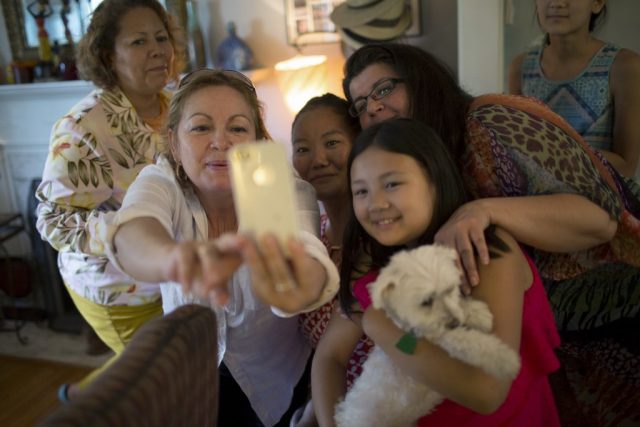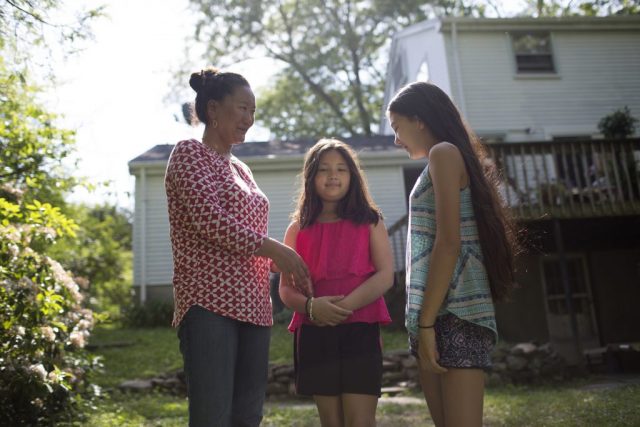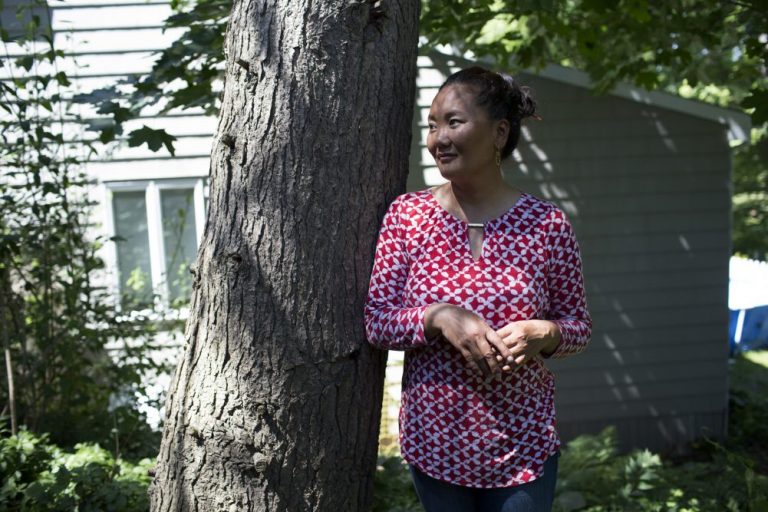On Father’s Day 2016, a small group gathered to celebrate Lhakpa Sherpa, who had returned to West Hartford, Connecticut, less than a week earlier after climbing to the top of Mount Everest for the seventh time.
Lhakpa, 43, broke the record she set herself back in 2006 for the highest number of summits by a woman. Her return to the mountain marked a new beginning after a tumultuous divorce from the mountain climber George Dijmarescu, whom she met at an Everest base camp in 2000 and married two years later. His abuse is documented in a series of Hartford Courant articles by Michael Kodos, who accompanied an Everest trip organized in part by Dijmarescu in 2004. After attempting to leave her husband more than once, as well as a trial, Lhakpa was granted a divorce by a Connecticut judge in early 2015.
Since then, Lhakpa has cared for their two daughters, as well as a son from a previous relationship, as a single mother with sole custody. She works as a housekeeper.
The people at the celebration included Lhakpa’s daughters—Sunny, 13, and Shiny, 9—her lawyer, Ramona Mercado-Espinoza from Greater Hartford Legal Aid, and Iris Ruiz and Jennifer Lopez from Interval House, a local domestic violence shelter where Lhakpa lived for eight months (the average stay is about three months). She has had her own apartment for the last three and a half years and still stays in touch with the group that helped her get back on her feet. The women are fiercely protective of Lhakpa, whose name is not widely known outside the climbing community, and her achievements.
“She’s grown so much. When we first met her she didn’t speak any English,” said Lopez, a supervisor and advocate at the shelter. “She knows how to get things done and she works for everything she gets. We’ve gotten attached to her because she’s humble . . . and she continues to see her future as something more.”
“She’s ready to share her story now,” Mercado-Espinoza said. “Now’s the time. She’s ready. She’s amazing. I think just getting away from her ex-husband and living her life freely has changed her.”

When Lhakpa leaves the U.S. and returns to Nepal and Mount Everest, she’s in a place that makes sense.
“[In West Hartford], I feel like I’ve been thrown in a big ocean and nobody is coming to rescue me . . . I’m very confused here. At Everest, you go up one way, you come down one way. So many roads I see here,” Lhakpa said. “In my heart, I want to climb this mountain again and again. I have some problems and I think, ‘ah, mountain season is coming. I want to get my boots and run away in the mountain.’”
Lhakpa doesn’t climb Mount Everest just to set another world record. When she helps guide a team, Lhakpa earns $6,000, with a $1,000 bonus if they summit. The money comes in a lot faster than in the United States, where she works a minimum wage job to support her children.
Lhakpa grew up in a Sherpa family in the village of Makulu, which lies in a valley about 12 miles south of Mount Everest. The village, she says, still lacks a school and a doctor. Many of her siblings are accomplished climbers as well, and her sister, Ming Kipa, previously held the record for being the youngest person to summit Mount Everest when she made it to the top in 2003 at age 15.
Lhakpa said that she understands the mountain better than anything else in her life, and that the only training she did before leaving for Nepal this year was walking all over Hartford. Once in Nepal her brother, who works for an expedition company, had her train much more intensely by walking between the camps at approximately 19,000 feet and 22,000 feet (Everest’s peak is 29,029 feet) to get her up to speed for the summit.
Last year, Lhakpa reached Everest’s base camp before having to turn back after the 7.8-magnitude earthquake hit Nepal on April 25, 2015. Back home, her lawyer and the women at the shelter didn’t hear for a month after the quake that she was alive and well, Mercado-Espinoza said.

Every time she summits, Lhakpa carries multiple flags of things she “likes and respects” in her pack. This year, she packed the American flag, as well as flags for both of her daughter’s schools and the domestic violence shelter.
Lhakpa said her children don’t have any interest in climbing. They understand that going to school is their job and that summiting Mount Everest is hers.
“My son tells me, ‘This is your job mama, because you don’t have an education. You keep going. We go to school.’”
Although Lhakpa is barely back from her record-breaking summit, she is already hoping to reach the top again in 2017. She says that both she and her children believe that she will come back every time, even though Lhakpa frequently witnesses dead bodies on the mountain.
“I’m not scared to die; I believe in the days coming I can die here [in Connecticut],” Lhakpa said. “My Buddhist culture says death is coming, but I’m still OK. I could have died many times, but my day hasn’t come yet.”
Want to learn more about Lhakpa Sherpa? Read our interview with her in the 25th anniversary issue
Thank you for subscribing to Tricycle! As a nonprofit, we depend on readers like you to keep Buddhist teachings and practices widely available.
